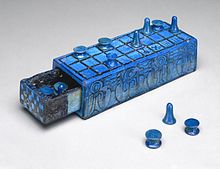
Back سينيت Arabic Senet Azerbaijani Сенет Bulgarian Senet Breton Senet (joc) Catalan Senet Czech Senet German Σένετ Greek Seneto Esperanto Senet Spanish
 | |
| Genres | Board game |
|---|---|
| Players | 2 |
Senet or senat (Ancient Egyptian: 𓊃𓈖𓏏𓏠, romanized: znt, lit. 'passing'; cf. Coptic ⲥⲓⲛⲉ /sinə/, 'passing, afternoon') is a board game from ancient Egypt that consists of ten or more pawns on a 30-square playing board.[1] The earliest representation of senet is dated to c. 2620 BCE from the Mastaba of Hesy-Re,[2] while similar boards and hieroglyphic signs are found even earlier, including in the Levant in the Early Bronze Age II period.[3][4] Even though the game has a 2,000-year history in Egypt, there appears to be very little variation in terms of key components.[1][5] This can be determined by studying the various senet boards that have been found by archaeologists, as well as depictions of senet being played throughout Egyptian history on places like tomb walls and papyrus scrolls. However, the game fell out of use following the Roman period,[2] and its original rules are the subject of conjecture.
- ^ a b Crist 2019 pp.107
- ^ a b Sebbane, Michael (2001). "Board Games from Canaan in the Early and Intermediate Bronze Ages and the Origin of the Egyptian Senet Game". Tel Aviv. 28 (2): 213–230. doi:10.1179/tav.2001.2001.2.213. S2CID 162219908.
- ^ Crist 2021 pp. 15
- ^ Piccione, Peter P. (July–August 1980). "In Search of the Meaning of Senet". Archaeological Institute of America. 33 (4): 55–58. JSTOR 41726340 – via JSTOR.
- ^ Piccione 2007 pp. 54